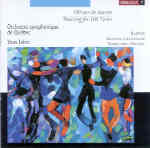This is a very strange collection. The best performances are the two works by the two Canadian composers, Claude Champagne’s tangy and charming Danse villageoise, and Francois Dompierre’s Les Diableries for violin and orchestra. Written as a competition piece, God only knows what it has to do with dancing, but it’s exceptionally well written to showcase just about everything you can do with a violin, and brilliantly orchestrated to boot. Darren Lowe plays as though he really wants to take first prize.
As for the rest, the Bartók Romanian Folk Dances always sound delightful and you can’t ruin them, but both the selections from Dvorák’s Slavonic Dances (Nos. 1,2,3,5,7,8,10 and 15) and the Brahms Hungarian Dances (Nos. 17-21, which were orchestrated by Dvorák, plus No. 1) suffer from some odd tempo choices, mushy rhythms (in the Dvorák especially) and an inconsistent approach to repeats. The sonics, while generally good, bury too much inner detail and the percussion lacks sparkle. As I said, this is a very strange collection, and it would have been a much better idea to devote the entire disc to interesting Canadian composers, instead of mixing them in with indifferently played repertory chestnuts.
































